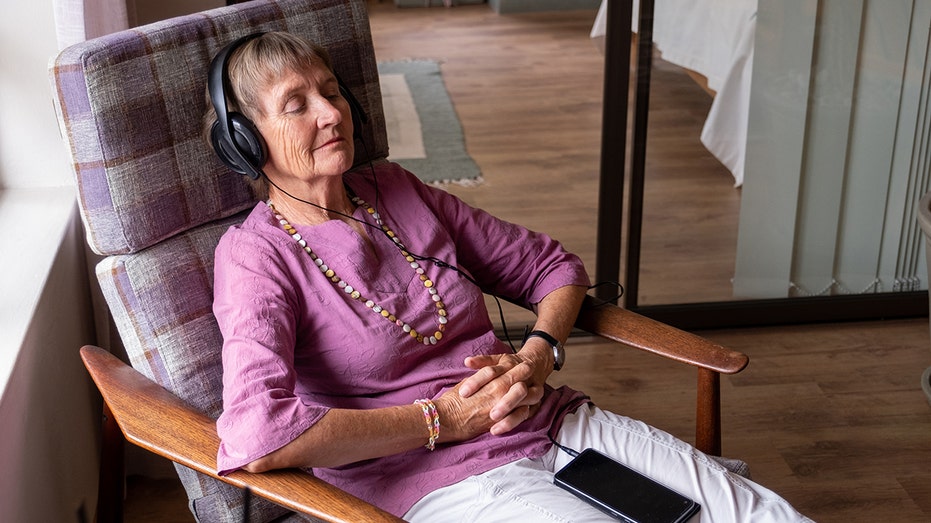Health
Music Reduces Dementia Risk by 40% for Seniors, Study Finds

A recent study from Monash University in Melbourne, Australia, reveals that seniors over the age of 70 who regularly listen to music may significantly lower their risk of developing dementia by nearly 40%. This cognitive disorder encompasses a decline in memory, thinking, and other mental abilities. The findings shed light on the potential benefits of music as a preventive measure against cognitive decline.
The research, which involved tracking over 10,800 adults aged 70 and older, found that those who consistently engaged with music exhibited a 39% lower risk of dementia compared to those who did not. Additionally, seniors who played musical instruments reported a 35% reduction in risk. Notably, combining both activities yielded even greater protective effects.
Significance of Music for Cognitive Health
Led by honors student Emma Jaffa and Professor Joanne Ryan, the study highlights the importance of lifestyle choices in brain health. “With no cure currently available for dementia, the importance of identifying strategies to help prevent or delay onset of the disease is critical,” Ryan stated. She emphasized that factors influencing brain aging extend beyond genetics and age, incorporating environmental and lifestyle decisions.
The research, published in the International Journal of Geriatric Psychiatry, indicates that music not only reduces the risk of dementia but also correlates with improved memory performance and overall cognitive function. Regular engagement in music activities was associated with a 22% lower risk of mild cognitive impairment, a condition that precedes dementia, and was linked to enhanced episodic memory—a crucial aspect for recalling everyday events.
Broader Implications and Future Research
Dementia currently affects approximately 57 million individuals globally, according to the World Health Organization. While the study suggests that music could serve as a simple, accessible strategy to support cognitive health, it does not establish a direct causal relationship. The researchers noted that the benefits of music were most pronounced among participants with higher educational attainment, specifically those who had completed at least 16 years of schooling.
The investigation aligns with a growing body of research supporting the idea that engaging in creative, social, and mentally stimulating activities can foster brain health in older age. A 2022 meta-analysis conducted in the U.S. and Japan corroborates these findings, showing similar cognitive benefits for older adults who play musical instruments.
While the potential of music as a protective factor is promising, experts urge caution regarding the definitive conclusions that can be drawn. Dr. Morten Scheibye-Knudsen, an associate professor of aging at the University of Copenhagen, acknowledges the importance of mental stimulation but notes that existing research on its effects remains inconclusive. He stated, “In general, it is advised to train your brain, but the data is actually not that clear,” highlighting the variability in outcomes from studies examining activities like music and puzzles.
Despite the ambiguity, Dr. Scheibye-Knudsen pointed out the added social benefits associated with playing an instrument, which can enhance social interactions—an essential component of healthy aging.
As researchers continue to explore the connection between music and cognitive function, the findings from Monash University provide valuable insights into simple lifestyle modifications that may help support brain health in older adults.
-

 Science1 month ago
Science1 month agoNostradamus’ 2026 Predictions: Star Death and Dark Events Loom
-

 Technology2 months ago
Technology2 months agoOpenAI to Implement Age Verification for ChatGPT by December 2025
-

 Technology7 months ago
Technology7 months agoDiscover the Top 10 Calorie Counting Apps of 2025
-

 Health5 months ago
Health5 months agoBella Hadid Shares Health Update After Treatment for Lyme Disease
-

 Health5 months ago
Health5 months agoAnalysts Project Stronger Growth for Apple’s iPhone 17 Lineup
-

 Technology5 months ago
Technology5 months agoElectric Moto Influencer Surronster Arrested in Tijuana
-

 Education5 months ago
Education5 months agoHarvard Secures Court Victory Over Federal Funding Cuts
-

 Health5 months ago
Health5 months agoErin Bates Shares Recovery Update Following Sepsis Complications
-

 Technology7 months ago
Technology7 months agoMeta Initiates $60B AI Data Center Expansion, Starting in Ohio
-

 Technology6 months ago
Technology6 months agoDiscover How to Reverse Image Search Using ChatGPT Effortlessly
-

 Science4 months ago
Science4 months agoStarship V3 Set for 2026 Launch After Successful Final Test of Version 2
-

 Technology7 months ago
Technology7 months agoRecovering a Suspended TikTok Account: A Step-by-Step Guide





















